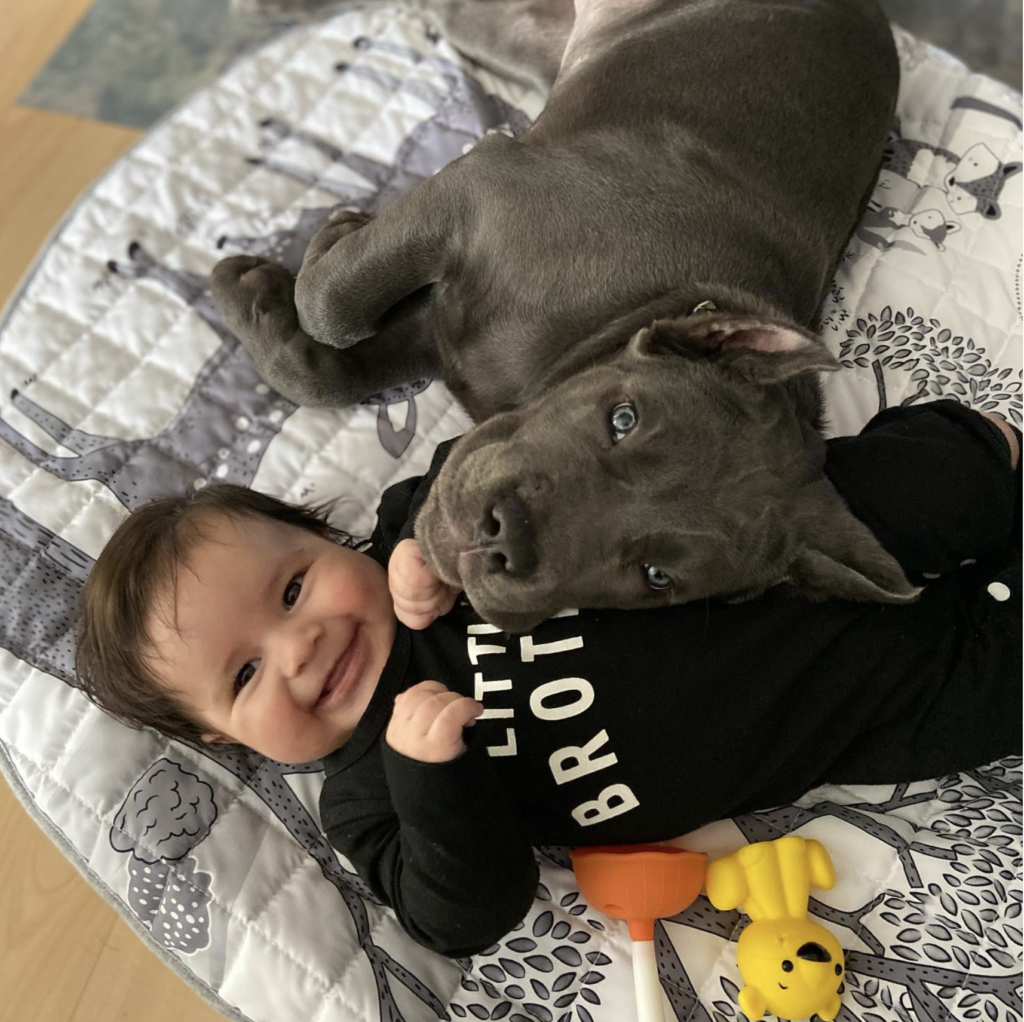The Cane Corso is a Mastiff-type dog that likely descended from Roman war dogs. They were bred in Italy to function as a guard dog and to hunt large game, while also fulfilling general farmland tasks. As farming changed and became more mechanized in the 20th century, Cane Corso numbers declined hugely. However, the breed avoided extinction and was rebuilt in the 1970s. While first entering the USA in the late 80s, this breed wasn’t officially recognized by the AKC until 2010.
The Cane Corso is physically impressive, boasting a muscular shape and possessing great strength. This is an intelligent breed that requires mental stimulation as well as plenty of exercise. They have a strong personality that can see them try be dominant with their owner, so training them while young is important to avoid this happening when they are fully grown and more difficult to control. The Cane Corso has a short coat which makes it relatively easy to maintain – although their size can make brushing a time consuming task.
Smart, trainable, and of noble bearing, the assertive and confident Cane Corso is a fearless protector. The Corso’s lineage goes back to ancient Roman times, and the breed’s name roughly translates from the Latin as “bodyguard dog.” You can expect a hight of 28 inches at the shoulder (withers) and weight of more than 100 pounds. They have a large head, alert expression, and are very muscular. They have short, stiff coat of hair, at a glance they can be intimidating creatures. Their imposing appearance is their first line of defence against intruders. Corsos are intelligent, eager to please, versatile, and intensely loyal to their humans, but are also assertive and willful, and can end up owning an unwitting owner. As with any other big guardian dog, responsible breeding and early socialization with people and other dogs is vital.

Cane Corsos need serious exercise. A brisk walk or better yet, run of at least a 2km in the morning and again in the evening will sustain their health and muscle tone. They make great companions on long walks, hikes, or bicycle rides. The Cane Corso was bred to work and is happiest when given a job to do. He needs mental as well as physical stimulation, or undesirable behaviour will result. Many Cane Corsos compete in agility, obedience, dock diving, protection sport, and tracking events.
Early socialization and puppy training classes are recommended for all dogs, but for a breed as big and strong as a Cane Corso, they are a must. Many Cane Corsos can be dominant and protective; socialization will help ensure that they grow into well-adjusted, well-mannered adults. Obedience training will keep them from becoming the boss in the household. Cane Corsos are intelligent and eager to please, so they are generally easy to train. Despite their appearance, Cane Corsos are all heart, and respond to love and rewards far better than to harsh corrections or training methods.
Cane Corso do well on a high-quality dog food, whether commercially manufactured or home-prepared with your veterinarian’s supervision and approval. Any diet should be appropriate to the dog’s age (puppy, adult, or senior). Some dogs are prone to getting overweight, so watch your dog’s calorie consumption and weight level. You want your dog to grow at a good pace, large breeds are prone to joint issues. Helping them grow at a good pace is important. REMEMBER bigger isn’t always better. Often with this breed people want the biggest dog, that is not safe or smart for the dogs wellbeing.
Treats can be an important aid in training, but giving too many can cause obesity. We often use high quality kibble for training and lessen their meals to compensate. Highly processed treats are a NO NO in our eyes. Look for freeze dried and less fillers and good quality.
Learn about which human foods are safe for dogs, and which are not. Check with your vet if you have any concerns about your dog’s weight or diet. Clean, fresh water should be available at all times.
The Cane Corsos coat is short, but double-layered. The undercoat, which varies in length depending on the climate the dog lives in. They shed throughout the year, especially during shedding season in the spring. Weekly brushing or daily during shedding season is recommended. You should use a medium-bristle brush, a rubber grooming mitt or tool, or a hound glove. This will help remove the dead hair before it can fall onto the furniture, it also helps remove dirt and promotes new hair growth. As with all breeds, the nails should be trimmed regularly, as overly long nails can be painful to the dog and cause problems walking and running.
Cane Corsos are generally healthy dogs. They can have health conditions such as hip dysplasia, idiopathic epilepsy, demodex mange & eyelid abnormalities. Large and deep-chested breeds are susceptible to bloat, a sudden, life-threatening stomach condition. Cane Corso owners should learn what signs to look out for, and what to do should they occur. As with all breeds, a Cane Corso’s ears should be checked regularly for signs of infection, and the teeth should be brushed often, using a toothpaste designed for dogs.
These are our favourite places for Food, Photos, Vet, Stores and More!
We buy Carnivora Raw and use their Supplements https://carnivora.ca
We love our vet and you will too! So helpful affordable and easy to talk to.
Sometimes raw just wont work for you we like to use Orijen Large Breed Puppy. *Buy 12 get 1 free @ Cowtown
They have the best highest quality raw freeze-dried pet treats and meal toppers that are yummy and nourish your pets with the best ingredients!
We love Cowtown for pet food, treats, toys, shampoo and accessories. They have some great quality dry foods that offer: *Buy 12 get 1 free*
We love Lianne, she does the best photos of pets and families! All of Lecter & Love's professional photos are done by Lianne.